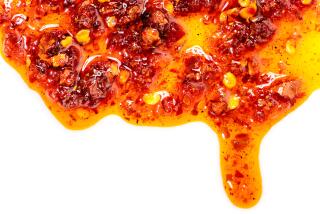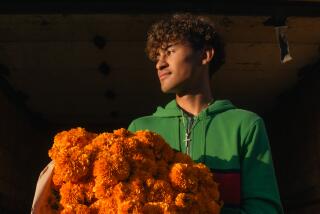Brokerage Moved Ton a Day Last Year : Chula Vista Family’s Business Thrives on Consumer Taste for ‘Baby Veggies’
- Share via
It is the little things in life that have made the Sluis family business so successful.
Yellow, pear-shaped tomatoes half the size of a golf ball, three-inch ears of corn and bite-size zucchinis are some of the Mexico-grown vegetables that have made the Sluises’ P.P.I. Co. Inc. what it is today: one of the county’s largest and most prosperous specialty produce brokerages.
Last year, 365 tons of the fresh, tiny novelties moved through the company’s Chula Vista warehouse on their way to nationwide wholesalers.
“Baby veggies are big at parties and light sit-down dinners. They give guests variety without being too filling,” said 24-year-old company President Rob Sluis.
Although the “baby veggie boom” peaked about three years ago, business remains strong and is growing. At the height of the boom, many spur-of-the-moment growers tried to get in on the action but they flooded the market with produce, causing most of them to fail because they did not have enough distributors for their products, Sluis said.
‘A Tough Business’
“Some people figured since their neighbor was growing some, they could make money on it, too,” Sluis said. “It’s not that easy. Like all farming, it’s really a tough business and not a quick way to make money.”
Sluis’ business is evidence, though, of how the small vegetables have found a niche in the epicurean landscape. Gourmet restaurants, yuppie gastronomes and now big supermarket chains are buying up the goods.
“The flavor of these vegetables is concentrated and they are visually appealing,” said Rob’s wife, Wyndellen, 29. “And with only a few vegetables on a plate, they are cost-effective for a restaurant to serve.”
Gourmet restaurants want only the most perfect and unblemished vegetables cooked (usually whole) for their customers. Therefore, specialty produce is handpicked and shipped without using machinery, which tends to bruise it, Wyndellen said.
“The small vegetables are too fragile, too delicate and they won’t sell if they are damaged,” according to Claudia Sluis, Rob’s mother. “A good deal of the high cost of specialty produce is the hand labor and packing.”
Short Shelf Life
Grocery store prices for the vegetables, for example, range from $1.99 to $5.99 a pound, depending on the store’s location and the season. Shipping the tiny edibles out of state is usually more expensive.
Not only are the vegetables susceptible to easy bruising, but they also have a short shelf-life. Claudia Sluis says that while regular vegetables may last 1 1/2 to two weeks from store to table, the miniature variety survives only two to three days.
Because spoilage occurs so rapidly, only 12 to 24 hours are allowed to elapse from the time the produce is picked until it arrives at its destination, Rob Sluis said.
From farms in the interior of Mexico and Baja California to those in Jamul and Otay Mesa, the produce is taken by refrigerated trucks to a warehouse on Industrial Boulevard. There it is placed in a 38-degree, 400-square-foot refrigerator until it is delivered to wholesalers. Nearly 75% of the company’s sales are to out-of-state buyers.
Edible Flowers
Globe carrots, red and gold beets, eggplant and wild mushrooms are among the regular crops P.P.I. buys. Tiny edible flowers such as pansies, nasturtiums and daisies are also highly popular, especially around the holidays, Rob Sluis said. These can be used to accentuate a cake or entree, float in a wine spritzer or toss in a salad.
The Sluis family’s stake in the miniature vegetables business begins long before the produce shows up at the warehouse. The family has been in agriculture for five generations, mostly as seed breeders. Rob’s Holland-born father, Pieter, grows the seeds for use on the 25 Mexican farms he and his wife oversee.
The elder Sluis’ company, called T-4, is P.P.I.’s largest supplier of vegetables.
“The Mexican farmers thought my father was nuts for wanting them to pick small vegetables on purpose,” Rob Sluis said. “Their fathers picked big. Their grandfathers picked big. And then you tell them to go in there and pick small?
“It wasn’t until they saw how profitable this was that they switched their way of thinking.”
More to Read
Inside the business of entertainment
The Wide Shot brings you news, analysis and insights on everything from streaming wars to production — and what it all means for the future.
You may occasionally receive promotional content from the Los Angeles Times.










